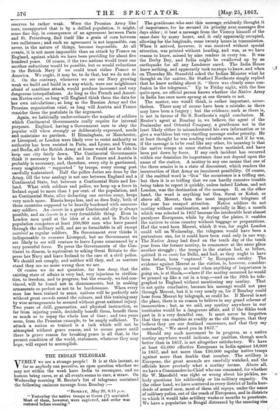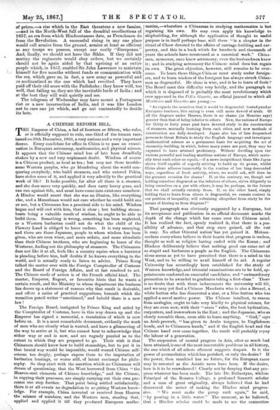THE INDIAN TELEGRAM.
ITERILY we are a strange people ! It is at this instant, so T far as anybody can perceive, an open question whether we may not within the week have India to reconquer, and no human being cares, or at all events seems to care, a–straw. On Wednesday morning M. Reuter's list of telegrams contained the following ominous message from Bombay :— "BOMBAY, May 20, 8.15 p.m. "Yesterday the native troops at Great ('?) mutinied. Most of them, however, were captured, and order was restored before evening." The gentleman who sent this message evidently, thought it of importance, for he *moused its •priority over, messages five days older ; it beat a message from the Viceroy hireRelf of the same date by many hours, and it only apparently occupied, allowing for the longitude, some twenty hours in transmission. When it arrived, however, it was received without special attention, was printed without heading, and was, as we have reason to know, missed by nine readers in every ten. It was the Derby Day, and India might be swallowed up by an earthquake for all any Londoner cared. The India House knew nothing, and apparently took no steps to know, and when \Jr on Thursday Mr. Stansfeld asked the Indian Minister what he thought on the matter, Sir Stafford Northcote simply replied that he knew nothing about it, "there was clearly some con- fusion in the telegrams." Up to Friday night, with the line quite open, no official person knows whether the Native Army in India has once more sprung at our throats or not.
The matter, one would think, is rather important, never- theless. There may of course have been a mistake, as there may have been a forgery ; but the evidence, such as there is, is not in favour of Sir S. Northcote's rapid conclusion. IL Reuter's agent at Bombay is, we believe, the agent of the Peninsular and Oriental Company, a gentleman not in the least likely either to misunderstand his own information or to give a worthless but very startling message undue priority. He at least thought he was sending valuable news, and if he was, if the message is to be read like any other, its meaning is that the native troops at some station have mutinied, and have been put down by force. If any such incident has occurred within our dominion its importance does not depend upon the name of the station. A mutiny in any one means that one of the three armies is in a state of discontent, which renders the insurrection of that Army an imminent possibility. Of course, if the omitted word is "Goa" the occurrence is a trifling one, but then it is so trifling that we can hardly conceive trouble being taken to report it quickly, unless indeed Lisbon, and not London, was the destination of the message. If, on the other hand, the word is anything but Goa, Surat or Kohat, or above all, Meerut, then the most important telegram of the year has escaped attention. Native soldiers do not mutiny without combination, and especially in May, a month which was selected in 1857 because the intolerable heat almost paralyzes Europeans, while by drying the plains, it enables the natives to cross country without baggage or preparations. Had the word been Meerut, which it was, for aught London could tell on Wednesday, the telegram would have been a portentous one, for it could have been read only in one way. The Native Army had fixed on the tenth day of the tenth year from the former mutiny, to commence at the same place another struggle ; the troops in the station had, as before, quitted it en route for Delhi, and had, as they ought to have been before, been " captured " by European cavalry. The evidence against Meerut as the station, is, however, consider- able. The Viceroy, as usual when anything of importance is going on, is at Simla,—where if the mutiny occurred he would be penned up like a rat in a trap,—and on the 20th he tele- graphed to England without mentioning any mutiny. That is not quite conclusive, because his message would not pass through Meerut, but it is very nearly so, for if Bombay could hear from Meerut by telegraph, so could he. If Meerut is not the place, there is no reason to believe in any grand scheme of insurrection ; but, as we said, any mutiny anywhere in our territories would be a dangerous affair, and if the Sikhs took part in it a very dreadful one. It must never be forgotten that they can combine as readily as the old Sepoys, that they believe they are our destined successors, and that they say constantly, " We saved you in 1857."
Should any such movement be in progress, as a native mutiny anywhere would indicate, our position, though much better than in 1857, is not altogether satisfactory. We have at least 63,000 effective Europeans in India against 18,000 in 1857, and not more than 130,000 regular native troops against more than double that number. The artillery is European, the great arsenals are carefully watched, and the officials know precisely what a mutiny means. Above all, we have a Commander-in-Chief who can command, for whether Sir W. Mansfield was right or wrong about his pickles, no- body questions his soldiership or his military capacity. On the other hand, we have scattered in every district of India hun- dreds of armed men, most of them old sepoys, under the name of military police, out of the reach of Europeans, and in districts to which it would take artillery weeks or months to penetrate. We have a population in Bengal distressed by the amazing rise of prices,—a rise which in the East threatens a new famine, —and in the North-West full of the dreadful recollections of 1857, an era from which Hindoostanees date, as Frenchmen do from the Revolution. A successful rising in any one place would call armies from the ground, armies at least as efficient as any troops we possess, except our costly "Europeans." And, finally, we should not have the Sikhs. If they did not mutiny the regiments would obey orders, but we certainly should not be again aided by that uprising of an entire people -which, in 1857, enabled Sir John Lawrence to maintain
.J himself for five months without funds or communication with the sea, which gave us, in fact, a new army as powerful and as acclimatized as the one which had revolted. They have paid off their old score with the Padishahs ; they know well, too well, that failing us, they are the inevitable lords of India ; and at the best they will wait quietly and see.
The telegram of Wednesday may have meant a Portuguese riot or a new insurrection of India, and it was like London not to care one jot which, and go out contentedly to decide its bets.































 Previous page
Previous page